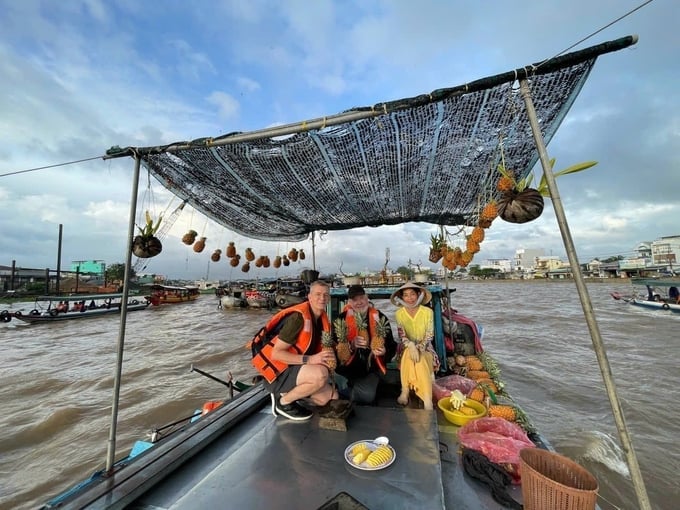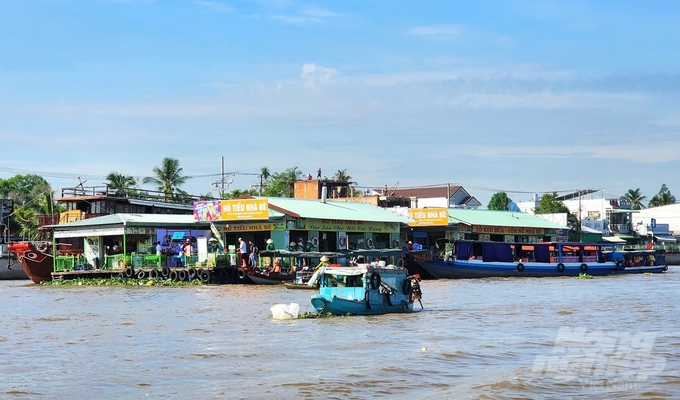November 27, 2025 | 10:30 GMT +7
November 27, 2025 | 10:30 GMT +7
Hotline: 0913.378.918
November 27, 2025 | 10:30 GMT +7
Hotline: 0913.378.918

Cai Rang Floating Market is one of the city’s tourist highlights that attracts a large number of tourists. Photo: Kim Anh.
The National Program—One Commune One Product (OCOP), after more than six years of implementation, has blown a breath of fresh air into rural agricultural economic development in the Mekong Delta region. From here, many OCOP products have now affirmed their position in the international market.
As for Can Tho city, the center of the Mekong Delta region, right from the first years of implementing the Prime Minister’s Decision 490/QD-TTg approving the OCOP program for the period 2018–2020, Can Tho city focused on implementing the project to develop the One Commune One Product program. Can Tho city consider this a solution to implement the new rural construction program based on internal forces, advantageous conditions in terms of raw material resources, knowledge sources, and the creativity of people in the area.
In Can Tho city, there are currently diverse types of tourism, including spiritual tourism, cultural tourism, garden eco-tourism, etc., with extremely famous tourist attractions such as Cai Rang Floating Market, Ong De Tourism Village, and many more. This is a very convenient and meaningful condition for OCOP subjects to connect with and promote their products.
Therefore, in order to exploit the strength of tourism and diversify output for OCOP products, the Can Tho Department of Agriculture and Rural Development has launched a point to display, introduce, and sell OCOP products on the Cai Rang Floating Market, one of the city’s tourist highlights that attracts a large number of tourists.

Nha Be Rice Noodles Facility, the OCOP product display point located on Cai Rang Floating Market. Photo: Kim Anh.
Output for OCOP products is the concern of many OCOP subjects; meanwhile, products on the Cai Rang Floating Market are currently not yet diverse and less widespread. Thus, introducing OCOP products into the business and tourism system on the Cai Rang Floating Market is one of the directions of the Can Tho city’s agriculture sector to both promote specific cultural values through trading activities on the river and contribute to diversifying output for products.
According to Mr. Tran Thai Nghiem, Deputy Director of the Can Tho Department of Agriculture and Rural Development, there are over 10 subjects participating in displaying their products at Nha Be Rice Noodles Facility, the OCOP product display point located on Cai Rang Floating Market, with a variety of OCOP products such as Kim Nhien custard apple tea, Hygie & Panacee herbal tea, Tu Hon gourami fish sauce, products of Dinh Gia Foods Co., Ltd., etc.
Mr. Nguyen Thanh Truc, Owner of Nha Be Rice Noodles Facility, shared that "I connect with OCOP products because these are quality products with eye-catching design and packaging. Besides, these products are typical specialties of Can Tho, so we need to promote more OCOP products to our market and tourists."

Over 10 OCOP subjects participated in displaying their products at the Nha Be Rice Noodles Facility. Photo: Kim Anh.
The Can Tho Department of Agriculture and Rural Development is promoting linkage, advertising, promotion, and market expansion for the image of OCOP products in Can Tho city to reach far. As for Can Tho city's agriculture sector, tourist attractions and OCOP subjects with OCOP products have a supportive and reciprocal relationship with each other. To be more specific, tourist attractions, restaurants, and hotels are places where subjects can display OCOP products and introduce, connect with, and sell products.
On the contrary, OCOP subjects have production processes from raw material areas, technical operations, movements in the production and product formation processes, and specific stories. These are potential destinations with which tourist attractions can connect to introduce tourists when they come to Can Tho city and tourist attractions connected to production sites.
Products are produced to serve the diverse needs of tourists. If this relationship is formed cohesively, it will be an opportunity for OCOP subjects and tourism entities to develop together.
After six years of implementing the OCOP program, Can Tho city has achieved initial results. Up to now, the whole city has 92 OCOP products, of which 58 are certified 4 stars and 34 are certified 3 stars.
Although the number of OCOP products in Can Tho city is not large, there are currently many products that have promoted strength and exploited culturally valuable raw materials to create typical products. Many products have reached out of Can Tho city to other regions, and some products have participated in the export market, contributing to promoting Vietnam's economic development as well as supporting the promotion of the Can Tho and Mekong Delta agricultural product brands.
Translated by Huyen Vu Thu
/2025/11/26/4909-2-154329_878.jpg)
(VAN) Pearl grouper farming in HDPE cages not only delivers economic efficiency but also contributes to protecting the environment, creating jobs, and promoting marine-based experiential tourism.

(VAN) The model of making a living under the forest canopy through the agroforestry system in Van Son commune, Bac Ninh province, is expected to generate an annual income of approximately VND 30 million/ha.

(VAN) Many enterprises in Can Tho are harnessing natural energy and reducing greenhouse gas emissions in their production processes, thereby contributing to the promotion of a sustainable green transition.
/2025/11/24/3536-2-112800_176.jpg)
(VAN) Dong Nai now has tens of thousands of hectares of forests certified for sustainable management, and this area will continue to be expanded in the coming period.

(VAN) Vinh Ha hamlet (Dai Xuyen commune, Hanoi) is shifting away from small-scale farming as households adopt bioscurity into their breeder chicken models.

(VAN) Heavy rains make aquatic species more vulnerable to disease. Proactive water management and high-tech systems help farmers prevent outbreaks and protect yields.

(VAN) Greenhouses are shifting production mindsets in Binh Lu commune, enabling farmers to ‘weather the sun and rain’ and secure stable vegetable harvests throughout the year.